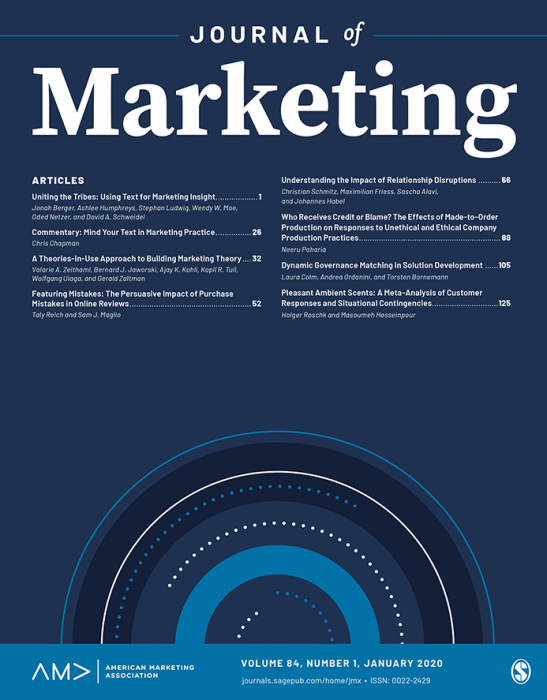EXPRESS: To Dispose or Eat? the Impact of Perceived Healthiness on Consumption Decisions for About-to-Expire Foods
IF 10.4
1区 管理学
Q1 BUSINESS
引用次数: 0
Abstract
Perceived healthiness of food is generally regarded as a positive attribute in food choices as it positively impacts consumers’ preferences. The current research demonstrates that in contexts where there is a time delay between a food’s production and its consumption (referred to as “about-to-expire” food), strong perceptions of a food’s healthiness can be detrimental. This is because consumers hold a lay theory that healthy food expires more quickly. In eight studies ( N = 3,552), we find that merely portraying food as healthy increases the perception that it expires quickly and that this effect attenuates when consumers hold the lay theory weakly or have a high level of knowledge about food expiration. Importantly, this lay theory leads consumers to avoid consuming healthy (vs. non-healthy) about-to-expire food, resulting in increased disposal intentions and decreased preferences. In designing sales promotions for about-to-expire food, managers should consider the healthiness of food products, as consumers prefer different types of sales promotions and require different magnitudes of price discounts for healthy (vs. non-healthy) about-to-expire food. Finally, adding an expiration date label that provides unambiguous guidance (i.e., “consume by”) can effectively mitigate the detrimental effect of perceived healthiness on the consumption for about-to-expire food.快讯过期食品的健康感知对消费决策的影响?
人们通常认为,食品的健康感是食品选择中的一个积极属性,因为它会对消费者的偏好产生积极影响。目前的研究表明,在食品生产和消费之间存在时间差的情况下(被称为 "即将过期 "食品),对食品健康的强烈认知可能是不利的。这是因为消费者持有一种非专业理论,认为健康食品过期更快。在八项研究(研究人数=3,552)中,我们发现,仅仅将食品描述为健康食品会增加消费者对其很快过期的感知,而当消费者持有的非专业理论较弱或对食品过期的知识水平较高时,这种影响就会减弱。重要的是,这种非专业理论会导致消费者避免食用健康(相对于非健康)的过期食品,从而增加弃置食品的意愿并降低偏好。在设计即将过期食品的促销活动时,管理者应考虑食品的健康程度,因为消费者喜欢不同类型的促销活动,对健康(与非健康)即将过期食品的价格折扣要求也不同。最后,添加一个提供明确指导的保质期标签(即 "食用日期"),可以有效缓解健康感知对即将过期食品消费的不利影响。
本文章由计算机程序翻译,如有差异,请以英文原文为准。
求助全文
约1分钟内获得全文
求助全文
来源期刊

Journal of Marketing
BUSINESS-
CiteScore
24.10
自引率
5.40%
发文量
49
期刊介绍:
Founded in 1936,the Journal of Marketing (JM) serves as a premier outlet for substantive research in marketing. JM is dedicated to developing and disseminating knowledge about real-world marketing questions, catering to scholars, educators, managers, policy makers, consumers, and other global societal stakeholders. Over the years,JM has played a crucial role in shaping the content and boundaries of the marketing discipline.
 求助内容:
求助内容: 应助结果提醒方式:
应助结果提醒方式:


